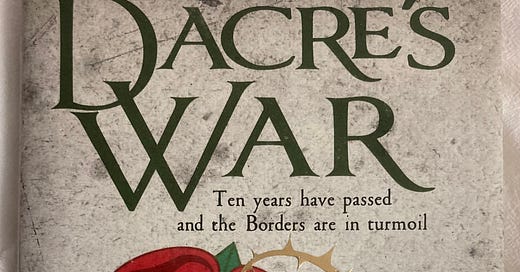Dacre’s War, is Rosemary Goring’s follow up to After Flodden. The story remains rooted with the Crozier clan in the Scottish Borders and English marches of the sixteenth century, but the scope of the story widens to include the courts and taverns of France and London. There is some continuity but when you’re dealing with one of the most treacherous periods of Scottish history and some of our most untrustworthy people, it’s a very lucky character that survives from one book to the next. In the ten years between volumes, Adam Crozier has gone some way towards consolidating his power in Teviotdale. With the boy King James V on the throne, a French regent, the Dowager Queen and her husband all tugging at the fabric of state, Scotland is torn into rags. The area is held in pressurized containment by the Warden General, Thomas Dacre. Pitting clans against each other, encouraging lawlessness so the rewards can flow into his pockets, Dacre is an old man, tiring of the weather and the daily grind of being Henry VIII’s man in the North. He begs the king to let him leave his post, a favour Henry isn’t keen to grant. Meanwhile Adam Crozier plots Dacre’s downfall as he seeks revenge for his father’s murder.
Where After Flodden echoed with horses’ hooves on the rough roads, Dacre’s War is more of a suspense thriller, full of back room negotiations, court room set-pieces and political intrigue. It’s a study in the corruption of power. The long knives are out and the border rings to the tune of vengeance. Behind every damask and tapestry there is a potential unfriendly ear.
It’s a rollocking good adventure, skilfully plotted by Goring. While the main thrust of the narrative – Crozier’s efforts to unite the Borders against Dacre – unfolds there are numerous sub-plots and side-games that open this novel beyond entertainment – though it certainly is entertaining. The ‘heresy’ of the new Protestantism slips in through the character of a French deserter from the Regent’s army, while gender politics and social expectations are probed through Adam and Louise’s marital tensions. This is an ambitious book, with clear, deep knowledge behind it and rewards multiple readings to tease out each layer. This academic weight combined with a campfire storyteller’s glee in a good tale is a welcome addition to the canon of Scottish historical fiction.
Scottish historical fiction suffers, in some quarters, from an unfair reputation. There is an image of ‘kings-and-claymores’ or ‘kilts-and-heather’ fiction that dogs Scottish history, aided by some publishers’ insistence on shortbread-tin covers and tartan spines. It isn’t helped by the perception – rightly or wrongly - that many have taken liberties with their scholarship. From Tom Devine’s justifiable labelling of John Preebles work as ‘faction’ to the long, dark curse Braveheart cast over the whole enterprise, abandoning historical fact for emotional manipulation and tub-thumping, our history hasn’t always been well served by our writers. Yet a recent resurgence, uncoincidentally arising with the debates around Scottish independence, is giving Scottish historical fiction a new, respectable lease of life. At the forefront is Goring’s work and Rona Munro’s stunning James trilogy, produced by our National Theatre in 2014.
In October 2015 Alan Bissett wrote in The Guardian about the impact of a No vote on Scottish artists, particularly writers. He argued convincingly that ‘artists have now entered a period of introspection, replacing the creative campaign’s colour and noise with a new ambivalence.’ History, as much as art, is the process by which we explore ourselves and craft the narratives that give our nation shape and drive. While a number of our speculative writers are beginning to use science fiction and fantasy as a stage on which to play out what-might-have-been utopias and we’ve-only-ourselves-to-blame dystopias, a serious, objective reappraisal of our past is also underway, embracing this ambivalence. It’s no surprise that Goring’s series (there’s a strong hint that the story of the Croziers isn’t over) is set in the Borders - with its geographical ambiguity and divided loyalties, it’s the perfect backdrop for some realistic self-appraisal. There’s none of the Royal Mile gift shop in works like Dacre’s War, nor is there a mass grave of slaughtered facts. Goring has stripped away history’s sepia-tinged distance, its sickly romance and self-pitying tragedy and shown us a Scotland coming to terms with its ambivalence and contradictions, picking itself up and dusting itself down. ‘The Scottish literature “project”,’ Bissett wrote, ‘also involves the sculpting of a distinct identity out of the stone of Britishness.’ With Dacre’s War, Goring has contributed an important piece to the next stage of that project.





I bet you loved watching Game of Thrones! Mandy and I just finished watching the final season - it was all free on Amazon Prime (Japan). We pretty much binged on it every weekend. LOL Cheers